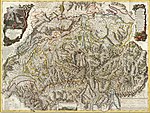| Revision as of 19:34, 18 November 2004 editAcsenray (talk | contribs)Extended confirmed users, Pending changes reviewers7,398 editsNo edit summary← Previous edit | Revision as of 12:41, 5 December 2004 edit undoItai (talk | contribs)Extended confirmed users11,418 editsmNo edit summaryNext edit → | ||
| Line 1: | Line 1: | ||
| {{History of Switzerland}} | {{History of Switzerland}} | ||
| During both ] and ], ] managed to keep a stance of armed neutrality, and was not involved militarily. It was, however, precisely because of its neutral status, of considerable interest to all parties involved, as the scene for diplomacy, espionage, commerce, and as safe haven for refugees. The ] ] movement of Zurich was essentially a cultural reaction the war, initiated by exiles. ] was also exiled in Zurich, from where he travelled directly to ] to lead the ]. | During both ] and ], ] managed to keep a stance of armed neutrality, and was not involved militarily. It was, however, precisely because of its neutral status, of considerable interest to all parties involved, as the scene for diplomacy, espionage, commerce, and as safe haven for refugees. The ] ] movement of ] was essentially a cultural reaction the war, initiated by exiles. ] was also exiled in Zurich, from where he travelled directly to ] to lead the ]. | ||
| In ], Switzerland joined the ]. | In ], Switzerland joined the ]. | ||
| Line 8: | Line 8: | ||
| Nazi Germany drew up plans to invade Switzerland, most notably ']', but the invasions were never carried out. | Nazi Germany drew up plans to invade Switzerland, most notably ']', but the invasions were never carried out. | ||
| The commercial involvement of some Swiss banks with the Nazi regime, particularly the gold trade of the ] was the object of public attention between ] and ]. The ] estimated that roughly half of the 890 million USD transactions in gold of the German ] was effectuated with the involvement of Swiss banks. Switzerland was accused of violation of neutrality, and prolongation of the war, because of these transactions, with particular vigour by US senator ] and attorney ]. ] officially investigated the charges for US the administration. Dealings in gold with Nazi Germany was seen as particularly immoral because much of the gold in question had been looted from Jews killed in the ]. Switzerland had already paid reparations to the Allies in ], and the Swiss banks settled for the payment of additional reparations of 1.25 billon USD to a special ] in ]. | The commercial involvement of some Swiss banks with the ] regime, particularly the gold trade of the ] was the object of public attention between ] and ]. The ] estimated that roughly half of the 890 million USD transactions in gold of the German ] was effectuated with the involvement of Swiss banks. Switzerland was accused of violation of neutrality, and prolongation of the war, because of these transactions, with particular vigour by US senator ] and attorney ]. ] officially investigated the charges for US the administration. Dealings in gold with Nazi Germany was seen as particularly immoral because much of the gold in question had been looted from Jews killed in the ]. Switzerland had already paid reparations to the Allies in ], and the Swiss banks settled for the payment of additional reparations of 1.25 billon USD to a special ] in ]. | ||
| ] | ] | ||
Revision as of 12:41, 5 December 2004
| Part of a series on the |
|---|
| History of Switzerland |
 |
| Early history |
| Old Swiss Confederacy |
|
| Transitional period |
|
| Modern history |
|
| Timeline |
| Topical |
|
|
During both World War I and World War II, Switzerland managed to keep a stance of armed neutrality, and was not involved militarily. It was, however, precisely because of its neutral status, of considerable interest to all parties involved, as the scene for diplomacy, espionage, commerce, and as safe haven for refugees. The 1917 Dada movement of Zurich was essentially a cultural reaction the war, initiated by exiles. Lenin was also exiled in Zurich, from where he travelled directly to Petrograd to lead the Russian Revolution.
In 1920, Switzerland joined the League of Nations.
Nazi Germany drew up plans to invade Switzerland, most notably 'Operation Tannenbaum', but the invasions were never carried out.
The commercial involvement of some Swiss banks with the Nazi regime, particularly the gold trade of the Swiss National Bank was the object of public attention between 1995 and 2000. The Bergier commission estimated that roughly half of the 890 million USD transactions in gold of the German Reichsbank was effectuated with the involvement of Swiss banks. Switzerland was accused of violation of neutrality, and prolongation of the war, because of these transactions, with particular vigour by US senator Alfonse M. D'Amato and attorney Edward Fagan. Stuart Eizenstat officially investigated the charges for US the administration. Dealings in gold with Nazi Germany was seen as particularly immoral because much of the gold in question had been looted from Jews killed in the Holocaust. Switzerland had already paid reparations to the Allies in 1952, and the Swiss banks settled for the payment of additional reparations of 1.25 billon USD to a special Holocaust Fund in 1999.
Category: